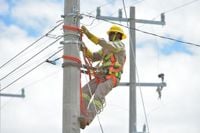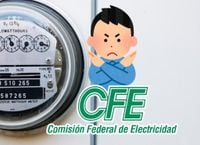On April 24, 2025, the Comisión Federal de Electricidad (CFE) made headlines by officially denying the existence of a special program dubbed "Casa por casa" aimed at installing smart meters and reviewing illicit connections. This announcement came in response to widespread reports from various media outlets and social media platforms, which suggested that the CFE was conducting a national operation targeting energy theft in homes and businesses.
In a statement shared on its official X account (@CFEmx), the CFE clarified, "Due to information disseminated incorrectly by various local and national media, the Comisión Federal de Electricidad clarifies that it has not recently initiated a special program called 'Casa por casa' to install smart meters, review possible illicit connections, or notify users of debts." The CFE emphasized that such activities are part of their routine operations, not a coordinated national effort.
Despite the CFE's reassurances, many citizens remain skeptical. Reports of CFE personnel visiting homes have sparked debates about the company's transparency and communication. Users have expressed their concerns about identifying legitimate visits from CFE employees, prompting the company to recommend that individuals verify the official identification of personnel before allowing entry into their homes.
To further address these concerns, the CFE suggested that if residents have doubts or suspect any irregularities during such visits, they should contact the CFE at the phone number 071. This number is also designated for reporting power supply failures. When reaching out, users are advised to provide their service number, complete address, and phone number to facilitate assistance.
As the CFE continues to face scrutiny, the public's frustration is palpable. Many users have taken to social media to voice their dissatisfaction with the CFE's handling of energy theft reports. Comments on these platforms reveal a growing impatience with the perceived lack of action against irregular connections, commonly referred to as "dablitos," which are devices used to manipulate meters or create illegal connections to the electricity supply.
One user lamented, "They are threatening us with power cuts when you installed the meters yourself." Another added, "How many unauthorized connections are there, and why aren't they being addressed?" Such sentiments reflect a broader discontent among users who feel that their complaints about energy theft have gone unanswered.
In light of the confusion surrounding the CFE's operations, it's essential to clarify what constitutes a legitimate visit by CFE personnel. The company has outlined several key indicators that can help residents identify authorized representatives:
- Personnel must wear official uniforms.
- They should present a valid identification badge that includes their photo, full name, and employee number.
- They must provide a work order number linked to the resident's address, which can be verified by calling 071.
- They are not authorized to enter without consent or request payments in cash or via transfer during the visit.
If a technical failure is noted during an inspection without evidence of manipulation, the CFE will replace the meter at no cost to the user. However, if illegal connections or intentional alterations are discovered, the consequences can be severe, including fines of up to 1,000 days of minimum wage (approximately 249,000 pesos) and potential prison sentences ranging from three to ten years, as outlined in Article 368 of the Federal Penal Code.
The CFE has reiterated that its regular activities include the verification of meter functionality, inspection of physical connections to the distribution network, notification of outstanding debts, and follow-up on technical reports in areas experiencing electrical faults. However, the company has not launched any intensive or coordinated strategy that would warrant the use of the name "Casa por casa," nor has it initiated any specific campaign at the national level.
Despite the CFE's efforts to clarify its position, the perception of discontent persists among certain segments of the population, particularly among users who have reported irregularities for years without receiving adequate responses. Social media comments indicate a demand for more effective action in detecting and penalizing illegal connections, as well as greater attention to technical reports in neighborhoods affected by electrical failures.
In conclusion, while the CFE maintains that it is not conducting a special operation called "Casa por casa," it continues to perform its regular monitoring and maintenance duties. The company remains open to receiving reports and complaints through its official channels, but the absence of a comprehensive national program to combat energy theft has left many citizens feeling unattended. As the situation evolves, it remains to be seen whether the CFE will implement new measures to strengthen its response to illicit connections and improve communication with its users.





